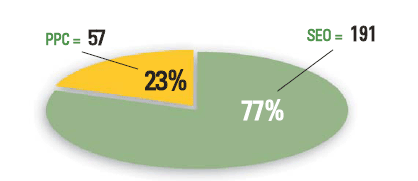Web Promotion Cagematch: PPC vs. SEO

by Peter Prestipino
Internet marketers have a number of ways to promote their websites. Engaging in social networking, email marketing, display advertising and affiliate programs are proven methods of acquiring new visitors and ultimately sales. But these methods pale in comparison to the top two online promotional opportunities of search engine optimization (SEO) and pay-per-click advertising (PPC.)
Proponents of SEO cite the ability to send large amounts of organic traffic without paying for each visitor. PPC advertising networks and agencies alike decry the complexities of SEO while touting the high level of control and qualified leads through paid advertising.
Whether you choose SEO, PPC or a combination of the two, it is important to understand that visitors from both sources of traffic have different motivations, behaviors and buying characteristics. Marketers need to understand how best to maximize the value of each visitor based on how they arrive at the site. Engine Ready (EngineReady.com) recently announced the results from a two-year study of 27 companies which measured visitor metrics by traffic source in order to 1) gain an understanding of how visitors behave based on how they arrive at a website, 2) provide insights into customizing the visitor experience based on traffic source, and 3) offer insights on how to leverage budgets among the four main traffic sources of SEO, PPC, inbound linking and branding.
Three primary areas related to ROI and brand awareness for these traffic sources were analyzed including the likelihood to convert a customer, amount of spend by the visitor, engagement and visitor behavior. Specifically, the metrics reviewed were average order value, bounce rate, conversion rate, value per visitor, average time spent on site, average number of page views per visit and the average length of time spent on each page viewed. The results of the study were truly intriguing. The most productive visitor arrives through direct access (type-in traffic or bookmarks) which makes a great deal of sense. Since the visitors must have accessed your site previously, they were familiar with the company's product or service offerings. What this shows us is that repeat visitors are more valuable than new visitors. In fact, according to the study, measuring an average sales dollar value per visit, Engine Ready found this group of visitors was over four times as valuable ($5.69 spent per visit) to those coming from an organic listing ($1.35 spent per visit.)
So what about SEO versus PPC? The research revealed that visitors from PPC ads outperformed those from organic listings in every category except average number of page views per visit. The average sales dollar value per visitor arriving from a PPC ad was $1.91, or 41 percent higher than that of a visitor from an organic listing. In fact, paid traffic converted at a 20 percent higher rate and experienced an average order value 18 percent above that of traffic from organic listings. What you may want to take away from this research is the importance of tracking and analyzing site metrics when formulating marketing strategies and establishing budgets. Doing so will yield a clear understanding of which visitors are most effective to meeting your goals and result in an opportunity to maximize the value of each customer.
Website Magazine Readers Speak Out: PPC or SEO?
In April, we conducted a survey asking our readers "If you were forced to choose between SEO or PPC, which would it be?" A total of 248 Web professionals responded and the results may surprise you. We also received several valuable comments. Mike Garland of SensibleMarketing.net said, "The real question is what is the right strategy overall for the client? If immediate revenue is critical, and site traffic is low, PPC may be the way to go. In addition, the lessons learned from PPC will assist in SEO development. Obviously the longer term value of SEO, with rated linking strategies will build value into the site."










